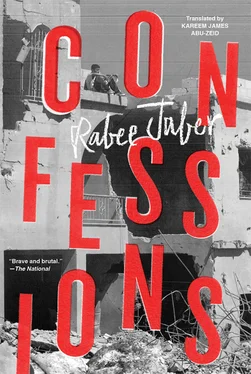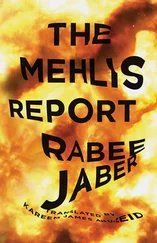My father, the one who’d been kidnapping people and killing them ever since his little boy had been murdered, his bloody corpse with its tattered clothes dumped on the road between the Museum and the Hôtel-Dieu (they dumped all the tiny corpses on the side of the road, in a vacant lot — there’s a building there now, with restaurants on the ground floor, where the lot used to be), my father, the one who carried me, bloody, from the demarcation line, was not my father. But he was my father too. Before that, I had (is “had” the right word?) a different life and a different father, a different mother and different siblings. I didn’t have just one life. I had a name that was different from the name I’ve come to have. I had a name other than my own. My father carried me to Achrafieh, and when I opened my eyes, when he realized I was going to live, he named me after the little boy whose picture was hanging on the wall of the living room, a black ribbon in its corner. He named me after the son who’d been taken from him. He named me Maroun.
The woman who helped the mayor of Achrafieh make a fake identity card for me is still alive. Her name is Evelyn Azar. I’ll tell you later how I went and visited her in her house in the Ramil district, and I’ll tell you what she said. They gave me my dead brother’s name, and the ID stated that I was the son of Felix and Victorine, and that I was born on September 29, 1971, which makes me a Libra. (This might seem silly, but my whole life I’ve continued to believe that I’m a Libra and I’ve remained interested in that sign, even though I’m not a Libra — my passion for horoscopes comes from my sisters, Najwa in particular.) When I was young I asked my sisters why I had the same name as my brother, how that was possible. They said my mother vowed to Saint Maroun that she would name two sons Maroun.
This is the order of my sisters: Julia is the oldest; then comes Mariana, who we call Mary; then Najwa; and Liliane is the youngest. I’m closest to Najwa, even though she now lives the farthest away, and even though she generally doesn’t see things the way I do. All of them are here now except Najwa, who’s in France. Julia has four children: Eli, Philippe, Georgette, and May. May was born in Canada, after they left Lebanon for Toronto, but they’ve returned now. They might leave again, I don’t know. Mary has three children: Carol, Lisa, and little Tony. Liliane has a daughter, Nathalie. Najwa isn’t married, but she has a boyfriend in Paris — before that she lived with a different boyfriend, but she lives alone now and hasn’t married yet.
In the house in Achrafieh, Mary, who’s a year younger than Julia, acted like the oldest. Julia tended to be lazy and stayed out of the way. Mary was the cook in our family, after our mother. My mother taught all the girls to cook, but Mary had a knack for it. My father only drank coffee that was made by either my mother or Mary. Whenever Julia made him a coffee, he used to say… No, not my father, my father didn’t say that — Ilya was the one who used to say that this isn’t coffee, it’s black water — yes, Ilya used to say that. My father would drink Mary’s coffee while he smoked his cigarettes on the balcony in the morning. He’d go into the bathroom when he was done, and a little while later he’d leave the house. When he got back, he’d climb up to the thatched shelter on the roof where he raised canaries. He spent half the day between the balcony and the roof, moving the cages from the balcony to the roof, or from the roof to the balcony, depending on the weather. That was after 1985. He didn’t raise birds before then.
My father was a different man before ’85. How many times had he changed? Did he change? My mother died in ’85. Her weak heart killed her. Over the years father took her to countless doctors, there wasn’t a single hospital he didn’t take her to. Ilya wanted her to travel to Europe to receive treatment, but she refused to leave the country. The doctors here told her there was no cure: her heart muscle was weak, too weak to withstand an operation or any other kind of treatment. The muscle shrank and atrophied. It was like having the heart of a small child in an adult’s body. I can’t recall my mother without seeing all the pill containers on top of the dresser by the bed, and in the dresser’s upper drawer, and in the lower drawer as well: countless pills, along with folded-up pieces of paper that were removed from the containers so Najwa could read about the side effects while Julia asked about this or that substance and Mary stood in the doorway with a wet towel between her hands, her sleeves folded up past her elbows, a drop of sweat running down her forehead. All I can remember is my mother lying in bed or on the couch, swallowing pills and repeating “O Virgin Mother,” with my sisters gathered around her.
Before her health deteriorated, she’d been quite active: she cooked and cleaned and swept the floors, and always prodded my father to take us to Mount Lebanon. Her favorite trip, the trip dearest to her heart, was to the Mar Charbel monastery. She only conceived a boy (Ilya) once she’d made a vow to Saint Charbel. She loved the saint, and a framed picture of him stood on top of her nightstand. I remember her wiping off the icon of the Virgin Mary with some oil, lighting the candle, and turning her head in my direction as I watched her, afraid she’d burn her fingers on the match (when I remember her now, she always seems drugged, half-asleep), and she raised her pale hand, with long fingers and a slender wrist, and it seemed like her fingers were too heavy for her, as if her wrist couldn’t bear the weight of those bones…. I haven’t forgotten how she used to lift her hand to summon me, I haven’t forgotten how I’d rush to kneel beside her on the sheepskin rug, how she’d take me in her arms until I disappeared in her warm body, how she’d say my name over and over again. She’d hold my head and smell my hair and say words I couldn’t make out because one of my ears was pressed beneath her arm and the other ear was crushed against her chest — I didn’t know what she was saying, but I told myself she was praying for the Lord to protect me.
Ilya always worried about her, and she always worried about me. I studied at the Nazareth School before moving to a different school, but both were close to the demarcation line. The Nazareth School was open when things were calm, but it would close whenever the clashes and shelling started up again. But often the school would be open and we’d be in class when the shelling started. They’d gather us together on the ground floor because the windows there were covered with sandbags. When that happened, the electricity would go out — the reserve generator usually broke down too — and the only lights the teachers had were matches and lighters. Later on they got some gas lanterns for the ground floor, as well as some battery-powered fluorescent lamps. I remember one of the first times, I’m not sure what year exactly: I remember the scared faces, and I remember the girls in their blue school uniforms, and I remember one of those faces looking straight at me: her name was Hilda, though her name’s not important, but if you want to write down a name, write down Hilda Sufayr. She used to ride the bus to school with me, she was from the neighborhood. We grew up together, at some point life took us in different directions, and then we met again. I loved her and wanted to marry her… Did I really want to marry her? I think so. I’ll tell you later about what happened and what her father said to me.
We met again when I was about to finish high school, when I was preparing for the college entrance exams. She’d transferred from that high school to a different one years earlier, and whenever I crossed paths with her — in front of the gas station, or at the intersection by the park, or in front of the ful (fava beans) restaurant that became, years later, a bakery for manakish sandwiches — we’d exchange a few polite words without thinking too much about it, without remembering anything from the old days…. But when I started going out with her afterward, when we went to the movies, out to eat, or to the park (the one in Sioufi) or to Kaslik, when we started growing closer, those memories emerged from my depths and I began to talk about things, asking her if she remembered them, too. She remembered some things and didn’t remember others. In the shelter, when I saw her looking at me in the school’s shelter — yes, she remembered that. She laughed and said she’d been looking at everyone, not just at me. But that’s not important — the important thing is that she remembered. There were other things I’d tell her that she didn’t remember. They weren’t important. They weren’t things that were directly related to her or to me — no, that’s not what I mean. I’d ask her if she remembered such and such a teacher, for example, the math teacher who always used to come to school wearing sandals, who had such and such a car, and she wouldn’t remember. I found that strange. I’d tell her a bit more about the person and she’d remember — and sometimes she’d remember even if I didn’t tell her anything else. Maybe she didn’t remember right away, right then and there, but later she’d tell me: Remember that teacher you talked about? I remember him, it came back to me two days ago. Or she’d say: Remember that field you told me about, the field with all the banana trees just past the school where they used to toss out the old chairs? It suddenly came back to me this morning, just like that, while I was packing my bag.
Читать дальше












